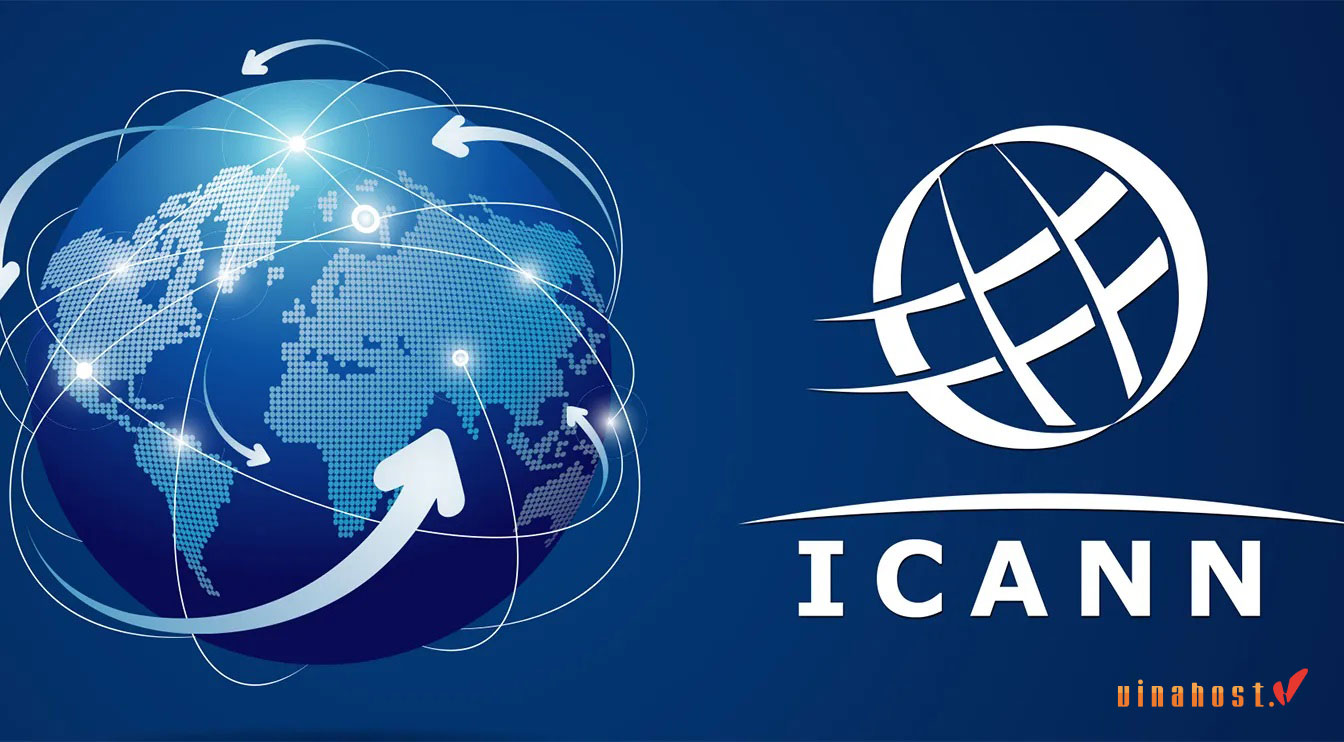What is ICANN? What does ICANN do? Why is ICANN known for its significant role in the global development of the Internet? ICANN’s role is crucial in maintaining the stability and uniformity of the internet’s global addressing and naming system, which helps ensure that the internet remains a universal and easy-to-access communication tool. Without keeping readers waiting, VinaHost synthesizes the most detailed and easy-to-understand information about the ICANN organization right in this article. Scroll down and read it now!
1. What is ICANN?
ICANN is an abbreviation for the Internet Corporation for Assigned Names and Numbers. It is a nonprofit organization established in 1998, responsible for managing domain names, IP addresses, and other internet-related information globally.
ICANN was established to take over the management of domain names and IP addresses previously handled by the Internet Assigned Numbers Authority (IANA), an organization managed by the United States government.
However, with the global development of the Internet, this management has become more important and needs to be carried out independently and globally. It is governed by a global Board of Directors, consisting of members from various countries, and is headquartered in California, USA.

ICANN’s functions include managing top-level domains, ensuring the availability and security of domain names, and promoting the development and use of the Internet globally.
Also Read: What is Domain & How It Impacts Your Online Presence
2. A Brief History Of ICANN
The Internet Corporation for Assigned Names and Numbers (ICANN) plays a critical role in the infrastructure of the digital world, particularly in domain name management and IP address allocation. Here’s a brief history of ICANN:
1998: Formation
It was established on September 18, 1998, as a nonprofit organization in response to a need for a more globally inclusive management of the Internet’s core resources. This need was identified and promoted by various stakeholders, including the U.S. government.
ICANN’s formation marked a significant transition from the previously U.S.-centric management under the Internet Assigned Numbers Authority (IANA), a function then performed under the auspices of the University of Southern California and supervised by Jon Postel, a key figure in the early development of the Internet.
The Early Years: Establishing Policies
In its early years, ICANN’s primary focus was on policy development for the domain name system (DNS). It introduced the Uniform Domain-Name Dispute-Resolution Policy (UDRP), which provided a mechanism for resolving disputes over domain name registrations. This was crucial in dealing with cases of domain squatting and trademark infringements.
2000s: Expansion of Top-Level Domains
The 2000s saw ICANN’s role expand with the introduction of several new top-level domains (TLDs) to accommodate the growing demand for domain names and diversify the domain name market beyond the original .com, .org, and .net. This expansion included country-code TLDs (ccTLDs) and generic TLDs (gTLDs), allowing for more specialized domains.
2010s: A Global Focus
The 2010s were defined by a major initiative to further increase the number of gTLDs, leading to a significant expansion in 2012 when it introduced over 1,300 potential new TLDs for application. This era also underscored a shift towards a more globalized approach in internet governance, reducing the influence of the U.S. government. In 2016, the U.S.
The Department of Commerce ended its formal relationship with ICANN, acknowledging its matured multi stakeholder governance model that included businesses, civil society, and governments from around the world.
Recent Developments and Challenges
In recent years, it has faced new challenges, including addressing the security of the DNS against increasing cyber threats and ensuring the integrity of global internet governance in an era of enhanced cybersecurity risks. The organization continues to work on improving DNS security, enhancing the accountability and transparency of its operations, and addressing issues related to internet privacy and the use of domain names.
Throughout its history, it has been at the center of debates over digital governance, demonstrating the complexities of managing a resource as expansive and vital as the global internet. Its evolution reflects the changing dynamics of internet technology and global politics, emphasizing the need for a collaborative approach to internet governance.
3. How Does ICANN Work?
ICANN (the Internet Corporation for Assigned Names and Numbers) functions as a central part of the internet’s global infrastructure by coordinating the Domain Name System (DNS), which links domain names with IP addresses. ICANN’s operations are built around a multistakeholder model, which includes an array of groups from different sectors all contributing to the decision-making process. Here’s an overview of how it works:
Multistakeholder Model
It operates on a multistakeholder governance model, which means it involves representatives from a variety of groups, including governments, civil society, academic institutions, the private sector, and technical communities. This model is designed to ensure that no single group has total control over the internet’s DNS and that the interests of the global internet community are considered.
Management of DNS
The core function of ICANN is to manage the DNS, which ensures that when you type a web address (like www.example.com), you are directed to the correct website. This system requires managing both the names (like ‘example.com’) and the numbers (the IP addresses that the names point to).
Allocation of IP Addresses
It allocates blocks of IP addresses to five Regional Internet Registries (RIRs), which in turn distribute these addresses to users in their respective regions. This structured distribution ensures orderly growth and management of IP addresses, facilitating efficient internet connectivity worldwide.

Assignment of Top-Level Domains (TLDs)
It approves and coordinates TLDs, which are the suffixes at the end of a domain name, such as .com, .org, or .net, as well as country-code TLDs like .uk or .jp. It also manages the introduction of new generic TLDs, expanding the domain space to include tags like .blog, .tech, and .name.
Policy Development
ICANN helps develop policies concerning the technical coordination of the DNS to ensure its secure, stable, and resilient operation. The policy development process typically involves extensive consultation and discussion among stakeholders to reflect the diverse interests of the global internet community.
DNS Security and Stability
It plays a crucial role in maintaining the security and stability of the DNS. This involves setting and enforcing standards and procedures for registrars and registries, managing the root zone of the DNS, and implementing measures to secure the DNS against cyber threats.
ICANN Meetings and Public Participation
ICANN holds three public meetings each year in different regions of the world to ensure global participation and transparency. These meetings are open to anyone and provide a forum for policy development and discussion of issues affecting the internet’s naming and addressing systems.
ICANN’s Supporting Organizations and Advisory Committees
It has several supporting organizations and advisory committees that focus on specific aspects of internet governance, such as the Generic Names Supporting Organization (GNSO) which deals with policy development for generic TLDs, and the Governmental Advisory Committee (GAC) which provides advice on public policy issues related to the governance of the DNS.
Also Read: What is a Subdomain? Exploring the Difference Between Domains & Subdomains
4. What Does ICANN Do?
4.1. Domain Names & DNS
Computers communicate through numerical codes, enabling them to access websites via their unique IP addresses. To simplify web browsing for users, domain names such as ours, vinahost.vn, are linked to these IP addresses.
Facilitating this connection, the domain name system (DNS) organizes the correlation between domain names and IP addresses. Given the inherent interdependence of these components, it’s logical for ICANN to oversee their management.
It primarily handles two key components of domain names: the second-level domain (SLD) and the top-level domain (TLD).
SLDs typically represent brands and are distinct. For instance, in vinahost.vn, “vinahost” serves as the SLD. The TLD, on the other hand, is indicated by “.vn”.
TLDs are categorized based on various factors such as geographic location, purpose, age, and operator, providing users with insights into their characteristics.
- Generic top-level domains (gTLDs) encompass extensions like .com, .org, and .net.
- Country code top-level domains (ccTLDs) include examples such as .uk, .ca, and .fr.
- New top-level domains (nTLDs) consist of extensions like .agency, .bio, and .charity.
- Sponsored top-level domains (sTLDs) feature extensions like .google and .apple.
With assistance from the Generic Names Supporting Organization and the Country Code Names Supporting Organization, ICANN oversees both SLDs and TLDs. These organizations are among the numerous bodies within ICANN that provide policy guidance.
4.2. IP Addresses
As you can see, IP addresses appear as sequences of numbers and occasionally letters, separated by dots or colons depending on their version. Each IP address serves to pinpoint a specific device and its network, facilitating communication between devices.
It oversees the allocation of IP addresses through a central repository, which is distributed among five Regional Internet Registries worldwide. Assisted by the Address Supporting Organization, an advisory committee within ICANN, it offers recommendations and aids the board in IP address management.
4.3. Root Servers
At the heart of the DNS hierarchy lies the root zone, housing 13 root servers responsible for managing domain name requests across various top-level domains.
Since its establishment in the ’90s, IANA, now a department of ICANN, has supervised the DNS root zone. Primarily, it delegates management duties for each root server to distinct organizations.
Also Read: What is Transfer Domain? & How to Transfer a Domain?
5. Why Does ICANN Matter?
By now, you likely grasp the significance of ICANN and why it exists.
In essence, ICANN’s importance lies in its role as a centralized authority equipped with the structure and authority to safeguard the internet from malicious entities while ensuring accessibility for website owners and everyday users.
Through the development and enforcement of policies over the years, it has enabled the internet to function reliably regardless of geographical location, socioeconomic status, or device type. This concept, known as “universal resolvability,” has become increasingly vital today, as internet access is crucial for various aspects of people’s lives, including entertainment, employment, and maintaining connections with loved ones.

Also Read: The Value of Domain Names: Choosing the Right Domain for Your Website
6. ICANN and the Future of the Internet
The future of the internet is intricately linked with the role and evolution of ICANN, the Internet Corporation for Assigned Names and Numbers. As the overseer of critical internet infrastructure, ICANN’s decisions and policies shape the direction and functionality of the online world.
One crucial aspect of ICANN’s role in shaping the future of the internet is its management of domain names and IP addresses. With the proliferation of new technologies and the increasing interconnectedness of devices through the Internet of Things (IoT), the demand for unique identifiers is only set to grow. ICANN’s ability to effectively manage and allocate these resources will be essential in ensuring the continued growth and stability of the internet.
Furthermore, it plays a vital role in maintaining the security and stability of the internet. As cyber threats continue to evolve and grow in sophistication, it must remain vigilant in implementing measures to protect the integrity of the domain name system (DNS) and prevent malicious actors from disrupting online services.
Additionally, ICANN’s role as a global governance body for the internet means that it must navigate complex geopolitical dynamics and balance the interests of diverse stakeholders from around the world. As debates over internet governance, privacy, and digital rights continue to unfold on the global stage, ICANN will play a central role in shaping the policies and regulations that govern the internet.
In summary, ICANN’s actions and decisions will play a crucial role in shaping the future of the internet. By effectively managing critical internet resources, maintaining security and stability, and navigating complex geopolitical dynamics, it will help ensure that the internet remains a vibrant, open, and accessible resource for people around the world.
7. FAQs
7.1. Does ICANN control internet content?
No, ICANN does not control internet content. ICANN, or the Internet Corporation for Assigned Names and Numbers, is responsible for the global coordination of the Internet’s system of unique identifiers, including domain names (like .com, .net, .org), IP addresses, and protocol parameters. This organization helps ensure the stable and secure operation of internet services.
ICANN’s role involves managing the DNS (Domain Name System), which helps users find their way around the Internet by translating domain names, which are easy for people to remember, into IP addresses, which computers need to locate each other on the network.
However, it does not have any role or authority over the content that is served on these domains, which is the responsibility of content providers, website owners, and governed by local laws and regulations.
ICANN’s function is purely technical and administrative, focusing on the infrastructure that helps the internet remain operational and accessible, not on regulating or overseeing the content itself.
7.2. Can ICANN shut down a website?
ICANN itself does not have the authority to shut down websites directly. Its role is to coordinate and manage the Internet’s system of unique identifiers, like IP addresses and domain names, ensuring the stable and secure operation of the internet’s addressing system.
When it comes to taking a website offline, this action typically involves other entities, such as domain registrars, web hosting providers, or legal authorities. For instance, a domain registrar can suspend a domain if the domain owner violates the registrar’s terms of service or if required by law. Similarly, web hosting providers can take down sites that violate their hosting policies or are unlawful.
ICANN’s indirect influence over such matters comes from its policy development responsibilities and its role in overseeing the organizations that manage the registration of domain names. However, the actual enforcement or decision to deactivate a domain or take down a website due to content or activity is generally outside of ICANN’s direct control.
Instead, such actions are governed by specific legal frameworks, the policies of individual service providers, and the regulatory environment in which the website operates.

7.3. How can I get involved with ICANN?
Getting involved with ICANN (the Internet Corporation for Assigned Names and Numbers) can be a rewarding experience, especially if you have an interest in the internet’s global governance, DNS management, or internet policy. Here’s how you can participate:
Join a Supporting Organization or Advisory Committee
It has several Supporting Organizations (SOs) and Advisory Committees (ACs) that focus on various aspects of internet governance, from technical issues to policy development. These groups are open to participants from around the world and provide a platform to discuss and influence internet governance policies.
Attend ICANN Meetings
It holds three public meetings each year in different regions of the world. These meetings are free to attend and open to anyone. They are an excellent opportunity to meet community members, engage in discussions, and gain insights into the latest developments in internet governance. You can also participate virtually as these meetings are webcast and offer remote participation tools.
Participate in Public Comment Periods
It frequently opens public comment periods on various issues related to DNS management and policy proposals. Submitting your feedback during these periods can directly influence ICANN’s decisions and policies.
Engage in ICANN’s Fellowship Program
This program supports individuals from underserved and underrepresented communities around the world to attend ICANN meetings. The fellowship aims to foster a broader understanding of ICANN’s work and encourage more global participation.
Follow ICANN’s Online Learning Platform
ICANN Learn is an educational platform that offers courses and resources to help you understand various aspects of ICANN’s work and the broader internet governance ecosystem.
Volunteer for a Specific Review or Working Group
It regularly forms review teams and working groups that focus on specific projects or areas of policy. These groups benefit from the expertise of community volunteers and can be a direct way to contribute to the development and refinement of internet management practices.
Stay Informed and Connect
Follow ICANN on social media, subscribe to newsletters, and connect with the ICANN community to stay informed about the latest issues, meetings, and ways to get involved.
Participating in ICANN is largely about contributing to the broader dialogue on how the internet is run and ensuring that it remains a stable and reliable network. Your involvement can help shape the future of the internet, and you can start at any level, from local community discussions all the way to international meetings.
Also Read: What is domain .com.vn? | Overview of domain names .com.vn
8. Conclusion
Summarizing the content provided by VinaHost in the article helps readers understand “What is ICANN?” As well as providing the most understandable overview. If you have any questions that need clarification, please don’t hesitate to contact us.
- Email: support@vinahost.vn
- Hotline: 1900 604
- Livechat: https://livechat.vinahost.vn/chat.php
You can also check out other interesting articles HERE to stay updated with new knowledge every day.
What is edu.vn domain? | Overview of domain names .edu.vn
What is Addon Domain – A Gateway to Website Expansion









